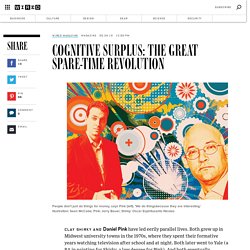

How you can use social machinery to power personalized news delivery. People have spent the past five years in Social Networking 101.

We figured out what social networks are, created our profiles and connected with friends. We rethought fundamental aspects of human relationships and adopted new ways of informing ourselves (“If the news is that important, it will find me.”) We learned new ways to stage revolutions and to follow them from afar. In the process of adding friends, following people and retweeting things, we have created a mosaic of what we like, which can be used to train Web services. We don’t think about it, but it’s there. If you haven’t already, take a couple of minutes to try out Intel’s Museum of Me. Then visit LinkedIn’s Connection Timeline to visualize your career and the people you’ve met over time. Bitly.tv shows the Web’s top videos, based on clicks through bit.ly links on social networks.
What you’re seeing in these services and many more are early stages of a new layer spreading across the Web – the social layer. Who are they? New York Times to add active personalization of article recommendations. Web 3.0. Uploads/2/8/7/4/2874839/why_do_people_share_online.pdf. Brains And Bots Deep Inside Yahoo's CORE Grab A Billion Clicks. If you’ve flitted across the Yahoo home page recently, you know how addictive its Today module can be.

That’s the little box at the top of the page (as in the image above) containing four news stories, including at least one you usually can’t help but click on. And Yahoo says that’s entirely intentional, the result of a lot of hard work spent trying to figure out how to serve up news that you, yes you, will find irresistible. The company started work on a powerful personalization algorithm four years ago. Now it’s paying dividends. The system generates 45,000 totally unique versions of the Today module every five minutes. And in the two years since the algorithm went live, Yahoo says clicks on the stories in the Today box among U.S. users have increased 270%. Yahoo is now in the process of rolling out the algorithm--it's nicknamed CORE (for Content Optimization and Relevance Engine)--to its other media properties. They might be on to something.
Cognitive Surplus: The Great Spare-Time Revolution. Clay Shirky and Daniel Pink have led eerily parallel lives.

Both grew up in Midwest university towns in the 1970s, where they spent their formative years watching television after school and at night. Both later went to Yale (a BA in painting for Shirky, a law degree for Pink). And both eventually abandoned their chosen fields to write about technology, business, and society. Now their paths are intersecting. In December, Pink, a Wired contributing editor, came out with Drive: The Surprising Truth About What Motivates Us.
And in June, Shirky is publishing Cognitive Surplus: Creativity and Generosity in a Connected Age, which mines adjacent territory. Wired had the two sit down for a conversation about motivation and media, social networking, sitcoms, and why the hell people spend their free time editing Wikipedia. Pink: A few days ago, I was talking with someone about Wikipedia. My New Year’s Resolution: Balancing Solitude and Connectedness. One of my New Year’s resolutions is to reduce distractions.

It’s about curating your network but allowing time for strategic serendipity. I’ll be writing about that topic in the weeks and months to come. I’ve discovered some wonderful discussion threads about one of my favorite topics: Information Overload and Strategies for Coping. As George Siemens points out the issue of information overload is not new. His definition of the problem is that it gets in the way of sustained mindfulness in order to get something meaningful done. Technology Approaches RSS readers worked for us in the early phases of social media, but as more people are connected through social networks and sharing and publishing information, there is more and more information out there.
Robert Scoble outlines different categories of filtering tools that can help you swim through the ocean of noise to find the good stuff. Paginator: These tools organize your social sources and streams into neat and organized pages.